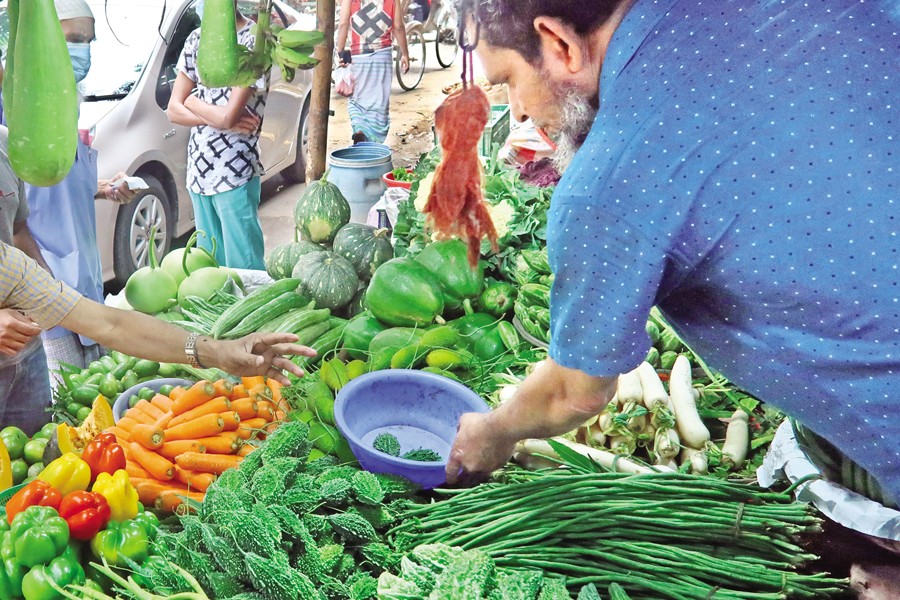
Published :
Updated :

Amid most vegetables already crossing Tk 100-per-kg mark, essential food items displaying further price volatility, food inflation reaching a record 12.5 per cent and millions of people cutting back on their diet, Bangladesh is all set to celebrate the World Food Day today.
The day is widely celebrated by many organisations concerned with hunger and food security, including the World Food Programme (WFP).
While the latest Global Hunger Index showcases the country's remarkable achievements in food security, there are still concerning factors that could potentially upend the success.
Take the case of Hamidur Rahman - a salesman at a stationery outlet in Buddhijibir Dhal in Rayerbazar - who was looking to purchase 100 grams of bitter gourd from a vendor on Sunday.
The vegetable vendor did not express any annoyance at such a small purchase, as they too are aware of the current financial woes of the customers.
"You can't buy a vegetable nowadays for less than Tk 100 a kg," said Hamidur. "Brinjal is being sold at Tk 120-150 a kg, can you imagine!"
"How could we afford beef at Tk 800 a kg, or hilsa at Tk 1200-2000 a kg. Even the cheaper sources of protein like broiler chicken, pangus, tilapia and eggs are becoming tough to buy amid their rising prices," he said.
Continuing the price volatility, four pieces of eggs are now at Tk 55-60, whereas just one and a half years ago, the maximum price was Tk 35-40. Broiler chicken, Hamidur said the spending for his five-member family has increased to a minimum of Tk 28,000-29,000 per month now, while their income remains at Tk 26,500, including his wife's earnings.
To cope with the situation, they have cut spending on red meat, fruits, milk, vegetables, fish and family gatherings. He said his wife eats the least to ensure availability for her two children and elderly father-in-law. Even though the rainy season has passed, he hardly considered buying a hilsa fish due to the soaring prices.
Prof Golam Hafeez Kennedy, a farm economist and a value chain expert, said the country's food inflation, which reached a decade-high of 12.5 per cent in August and September this year, is unlikely to cool off anytime soon.
He pointed the finger at higher import costs thanks to the gradual devaluation of the local currency Taka against the US dollar. The oligopoly of businesses, manipulating the market, is exacerbating the plight of millions, Prof Kennedy added.
Prof Dr Selim Raihan, executive director of the South Asian Network on Economic Modeling (SANEM), said a hike in diesel prices and the appreciation of the US dollar since the beginning of the Russia-Ukraine war were key factors contributing to the surge in import costs, thereby driving up inflation.
In addition, he said the income of a large portion of the population has not increased, resulting in a growing disparity between wage growth and the inflation rate.
This has led to a decrease in purchasing power for low and low-middle-income individuals, as inflation erodes their real incomes, he said.
Prof Selim Raihan warned that this situation could lead to a further increase in poverty and negatively impact the dietary intake, education, healthcare and other key needs of millions.
According to the Bangladesh Bureau of Statistics (BBS), high inflationary pressure has been eroding the real wages of labourers, particularly due to volatility in the Consumer Price Index (CPI) over the past few months.
tonmnoy.wardad@gmail.com


 For all latest news, follow The Financial Express Google News channel.
For all latest news, follow The Financial Express Google News channel.